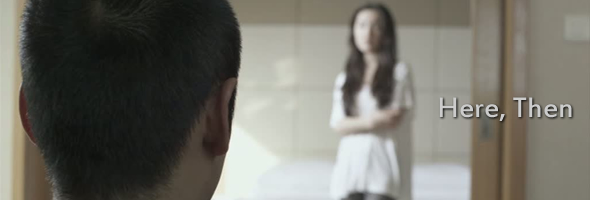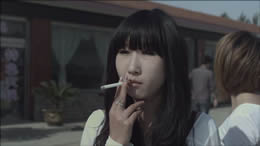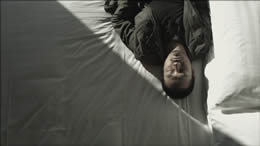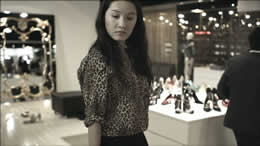
Color
, 2012, 94m.
Directed by Mao Mao
Starring Huang Tang Yijia, Wang Yizheng, Li Ziqian
Second Run (DVD) (UK R0 PAL) / WS (1.78:1) (16:9) / DD2.0
 A languid Chinese art film aiming for the challenging
A languid Chinese art film aiming for the challenging  heights of Michelangelo Antonio and Wong Kar Wai, Here, Then almost defies the audience to connect all of its dots as it paints a picture of disaffected modern youth. One of the few constants is sex, which is depicted as either consensual and a positive distraction or a violent attack, while surface distractions like fashion offer temporary relief as well.
heights of Michelangelo Antonio and Wong Kar Wai, Here, Then almost defies the audience to connect all of its dots as it paints a picture of disaffected modern youth. One of the few constants is sex, which is depicted as either consensual and a positive distraction or a violent attack, while surface distractions like fashion offer temporary relief as well.
The characters swimming in this beautiful, opaque fishbowl of a film include Yangyang (Yijia), who lives in a farming town, and Xiao Bin (Yizheng), a restless young man who doesn't take rejection well. Then there's Xiao Bin (Zigian), who's planning to get away to Beijing and inspires similar thoughts in Yangyang, who has a mysterious tie there via a displaced cell phone. The film carefully studies each of them, implying connections that may or may not exist as they cling to some reason for their daily existence.
Obviously this film won't be for everyone, but for those willing to immerse themselves in a mood piece with some of the most striking long camera shots in years, this is a strangely haunting and affecting film that actually grows in power  after it's had time to linger in the mind for a while. A young director making his debut here, Mao Mao exhibits a strong sense of locale and visual economy; whether that will translate to an evolving career as a filmmaker remains to be seen, but this is certainly a promising start.
after it's had time to linger in the mind for a while. A young director making his debut here, Mao Mao exhibits a strong sense of locale and visual economy; whether that will translate to an evolving career as a filmmaker remains to be seen, but this is certainly a promising start.
A surprise festival award winner, Here, Then makes its world home video debut with this subtitled DVD from Second Run, continuing their strong run of solid international releases that might have otherwise fallen through the cracks for many English-speaking audiences. The transfer approved by the director looks excellent given the nature of the film, which often favors bright sunlight and sometimes pallid colors to create a hypnotic feeling in many scenes. The color white plays a prominent role in many shots, and the sensitive textures and compositions come through very strongly. The optional English subtitles are very good, though long stretches of the film pass with no dialogue at all, while the two-channel audio sounds like an authentic rendering. The sole video extra is an 11-minute interview with the director, who talks about how the film evolved from a more narrative-heavy project in its initial conception and how he decided to go into filmmaking for a living. Also included is a liner notes booklet containing an essay by Harret Warman, who uses the film's triumph at the 2012 Edinburgh International Film Festival as a springboard for a discussion of the standout themes and images enclosed within its simple and immaculate exterior.
Reviewed on July 14, 2013.


 A languid Chinese art film aiming for the challenging
A languid Chinese art film aiming for the challenging  heights of Michelangelo Antonio and Wong Kar Wai, Here, Then almost defies the audience to connect all of its dots as it paints a picture of disaffected modern youth. One of the few constants is sex, which is depicted as either consensual and a positive distraction or a violent attack, while surface distractions like fashion offer temporary relief as well.
heights of Michelangelo Antonio and Wong Kar Wai, Here, Then almost defies the audience to connect all of its dots as it paints a picture of disaffected modern youth. One of the few constants is sex, which is depicted as either consensual and a positive distraction or a violent attack, while surface distractions like fashion offer temporary relief as well.  after it's had time to linger in the mind for a while. A young director making his debut here, Mao Mao exhibits a strong sense of locale and visual economy; whether that will translate to an evolving career as a filmmaker remains to be seen, but this is certainly a promising start.
after it's had time to linger in the mind for a while. A young director making his debut here, Mao Mao exhibits a strong sense of locale and visual economy; whether that will translate to an evolving career as a filmmaker remains to be seen, but this is certainly a promising start.